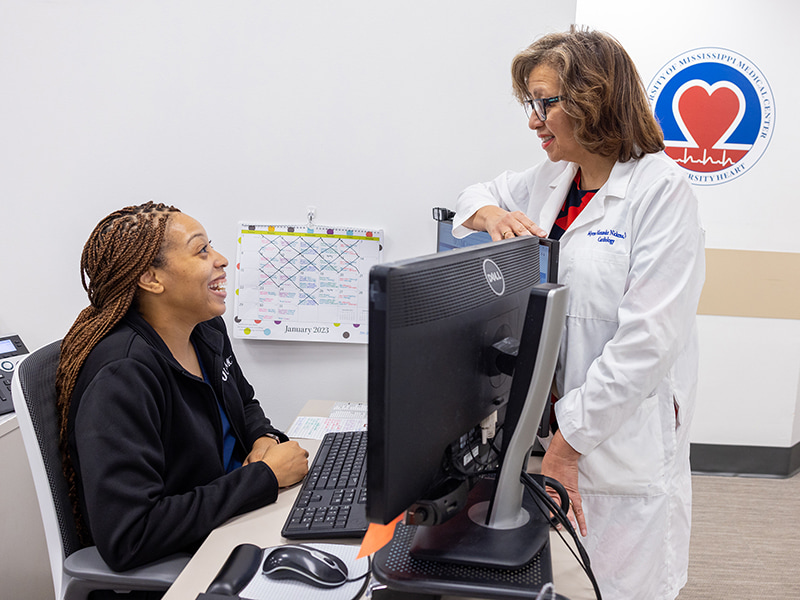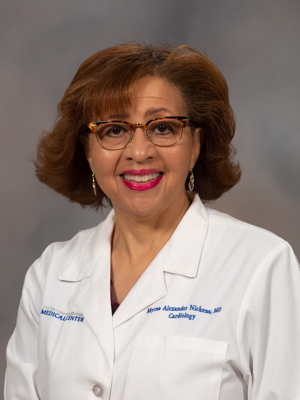Women’s heart health in February spotlight

As she sat in an easy chair, cradling her two-week old daughter Kiera, Tameka Roberson’s life changed in a heartbeat.
“My husband said that all of a sudden, I called out his name,” said Roberson, a customer care representative for the University of Mississippi Medical Center Division of Cardiology.
“He could tell something was wrong. By that time, I’d already had a heart attack. He gave the baby to one of the older kids, called 911 and immediately started doing CPR. He did it until the ambulance came,” Roberson said.
That day in October 2019, Roberson was experiencing spontaneous coronary artery dissection, or SCAD. It’s a little-known type of heart attack caused when a sudden tear occurs within one or more of the coronary arteries. The flap of skin caused by the tear partially or completely blocks blood flow, causing a heart attack or cardiac arrest.

Due to her husband LaKeith’s quick actions and more than a week in UMMC’s cardiovascular intensive care unit, the mother of three is healthy today. “I see Dr. (Myrna) Alexander Nickens, take two medications and have regular appointments,” the Byram resident said.
February is American Heart Month, a federally designated observance that encourages Americans to focus on their heart health. Coupled with that is the American Heart Association’s Go Red for Women observance, which raises awareness for heart disease and stroke in women.
Although cardiovascular disease is the leading cause of death globally, it claims more women’s lives than all forms of cancer combined, the AHA says. Cardiovascular disease is the No. 1 killer of women - yet most cardiovascular diseases can be prevented with education and healthy lifestyle changes.
“The No. 1 cause of death in the maternal population is cardiovascular as well,” said Alexander Nickens, a cardiologist and professor of medicine. “Most people don’t realize that pregnancy is a stressor. The incidence of cardiovascular disease is especially higher in the African American population across the nation because of preeclampsia and hypertension in pregnancy.”
Likewise, there’s an increased risk of SCAD in pregnant and postpartum women, Alexander Nickens said. “And women who have problems during pregnancy are at increased risk later in life of heart disease. If they have hypertension during pregnancy, there’s a good chance they’ll have it 10 or 20 years later.”
Roberson, she said, “was especially blessed to have her husband perform CPR, because all three of her coronary arteries had a tear. She was in cardiogenic shock, and she required life support.”
Roberson said the heart attack took her by surprise.
“Before I got pregnant, and during pregnancy, I had no health issues. There was no way in the world that I would have thought two weeks after having a baby I’d have a heart attack,” she said.
But there were warning signs that Roberson didn’t recognize could point to a deadly condition.
“Once I had the baby, at night I’d have really bad headaches when I would try to go to sleep,” she remembered. “I’d have to stand up, and then I’d feel better and it wouldn’t hurt as much. I started sleeping in a recliner next to the baby’s crib.
“I had chest pains. I should have notified my doctor, but with me not having any other health issues, I brushed it off.”
The AHA recommends anyone having signs and symptoms of a heart attack to call 911 and get to a hospital immediately. The warning signs include:
- Uncomfortable pressure, squeezing, fullness or pain in the center of the chest that lasts for more than a few minutes, or goes away and comes back.
- Pain or discomfort in one or both arms, the back, neck, jaw and stomach.
- Shortness of breath, with or without chest discomfort.
- Breaking out in a cold sweat, being lightheaded or being nauseated.
Emergency care also is warranted for possible stroke. Those warning signs include sudden numbness or weakness of the face, arm or leg, especially on just one side of the body; sudden confusion and trouble speaking; trouble seeing or walking; dizziness or loss of balance; and sudden severe headache.
“I know it sounds like a broken record, but people are still not believing,” Alexander Nickens said. “They are still not making lifestyle changes. Stroke is the No. 1 cause of disability in the United States in people over 40, and there are more women who have had a stroke than men.”
Most signs and symptoms of heart attack are the same in men and women – but not all. That can leave some women dismissing symptoms they shouldn’t. Women are somewhat more likely than men to experience shortness of breath, nausea and vomiting, and back or jaw pain.
“As a busy mom, I know that we aren’t always the best about taking care of ourselves,” said Jennifer Hopping, executive director of the American Heart Association Metro Jackson office. “We take care of our families, but we don’t get ourselves to the doctor for a checkup.
“One in three women will be affected by heart disease,” Hopping said. “When I talk to my friends, I say that this is absolutely a women’s issue, and to be aware of your body. If you’re not feeling well, don’t ignore the signs and symptoms.”
University Heart and the Office of Well-being are teaming to present heart-healthy activities for students and employees during the month of February. They include wearing red on Feb. 3, the day of a noon-1 p.m. walking event in the University Heart circle; a hands-only basic CPR class Feb. 7 from 11:30 a.m.-12:30 p.m. in the Simulation Center on the third floor of the School of Medicine; and blood pressure screenings and pet therapy by the UMMC Business Office across from the University Heart back hallway, 11 a.m.-1 p.m. Feb. 8 and Feb. 16.
A Heart Month focus this year is empowering people to perform hands-only CPR, Hopping said. “Our goal is for one person in every household to know what to do. They don’t have to go through a full class, but instead to just know the basics of how to react in an emergency,” she said.
Roberson’s heart health advice to other women?
“If something’s not right, please reach out to your doctor immediately,” she said. “Please don’t brush it off like I did. It’s a serious matter.”
Events for staff and students
- Go Red Day Walk: Feb. 3, noon, University Heart Circle Drive
- Hands Only CPR Training: Feb. 7, 11:30 a.m., School of Medicine SM311
- Blood Pressure Screening: Feb. 8, 11 a.m., Business Office hallway
- Heart Health 101: Feb. 14, noon, WebEx
- Blood Pressure Screening: Feb. 16, 11 a.m., Business Office hallway
- Hands Only CPR Training: Feb. 24, 11:30 a.m., School of Medicine SM306
- Well-being Desk Yoga: Feb. 28, noon, WebEx


